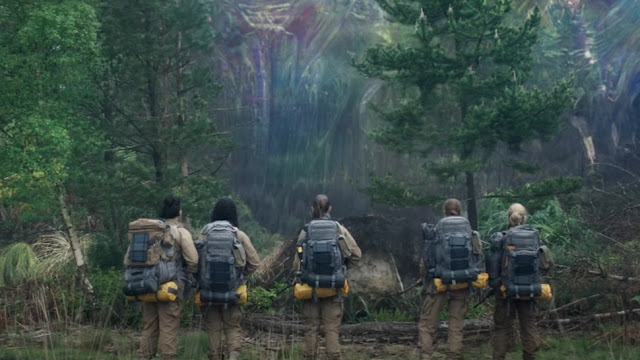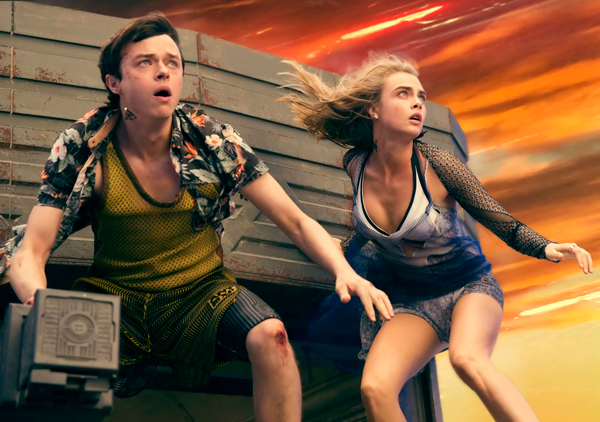On paper, Annihilation is everything I want from a movie. The film stars a group of female scientists and explorers – a biologist, physicist, psychologist, anthropologist, and paramedic – venturing into an unknown phenomenon dubbed “the shimmer.” Once inside the glimmering sphere that blankets a small piece of land in Florida, they reflect on the circumstances that led them each to accept the risky mission and confront the physical horrors that stalk them through the bizarre, mutated landscapes.
Much like the perilous creatures that attack the expedition at every turn, Annihilation has faced a number of challenges before its release. To start with, there’s the inherent difficulty in an adaptation of the other-worldly source material. Director Alex Garland (Ex-Machina) penned Annihilation’s script, which is a film adaptation of the novel by the same name from writer Jeff VanderMeer’s Southern Reach Trilogy. When I read the book, it was hard for me to fathom how it’d ever translate to the big screen. The easy answer is that, for the most part, it doesn’t – the movie feels more of an inspiration from the novel than an adaptation, which is probably for the best. But Garland’s choice to cast Natalie Portman and Jennifer Jason Leigh in roles that were described in later books as being of Asian and Native descent sparked controversy.
Once made, the film ran into post-production woes when Paramount sold its international rights. The decision was reportedly made after the film tested poorly in screenings with general audiences, and results in a fairly unusual release schedule, which gives Annihilation a theatrical release in the U.S., but a Netflix release only 17 days later outside of the U.S.
So, in spite of all those challenges, does the film deliver? Not completely.
That’s not to say Annihilation doesn’t have a lot going for it. Tessa Thompson, Jennifer Jason Leigh, Gina Rodriguez, and Tuva Novotny make up a mostly-stellar cast, particularly Rodriguez. The film’s last 30 minutes are some of the most daring, original, and intriguing I’ve seen in years, and that alone may be worth the cost of admission. And above all, Annihilation maintains a unique psychological atmosphere a la The Thing, hovering somewhere between science fiction and horror. It’s easy to compare it to films like Solaris and The Fountain.
Those above qualities are so exemplary, it’s all the more painful to feel like the film doesn’t entirely live up to its potential. Where Annihilation let me down was in its characters, who are described as “broken” but barely given enough room to develop. The novel takes a fairly unique approach in designating each team member by her role: no one has a name, only a function within the team, like “biologist.” It felt like the movie traded that approach for a lesser one: the characters get names, but beyond that, each character is labelled with a self-destructive behavior (e.g. alcoholism, self-harm). While the movie showcases external conflicts and bizarre visuals, mostly in the form of strange and mutated creatures or plant life, I would have gladly traded some of that to spend more time mid-movie with the characters’ internal struggles as they take in the mission through their own lenses, rather than a bit of expository dialogue to label each of them in a matter of seconds. The movie felt like it had a lot to say about depression and mental illness, but it also barely scratched the surface with anyone but it’s lead character.
Which brings me to the most difficult element of Annihilation for me. I don’t have strong feelings about Portman’s abilities as an actress, save for enjoying her in Black Swan. But something about her performance in this movie felt off from the start and only got more distracting as the film went along. There were moments where I felt like she was still in character as Jackie Onassis but was suddenly wandering an alien-like terrain with a gun in hand. It was a very theatrical performance that somehow registered as insincere. As a result I only ever saw her as Natalie Portman Acting and never as the story’s protagonist, and the emotional connections didn’t land.
I’ve also seen this mentioned from other critics, and it’s worth noting: Annihilation is not easy to watch in a crowded, restless theater. While those around me were mostly engaged, the film’s somewhat uneven pacing and more unusual visuals provoked a lot of mid-movie discussion among viewers around me. About halfway through the movie, I began wishing I had the option to watch on Netflix instead, but the visuals are better served on a big screen. If you’ve got the option to see it in a fairly empty theater, that’s probably your better bet.
My expectations for Annihilation were probably too high, but I wish it’d taken a little more from the spirit of the book and spent less time on CGI’d landscapes and creatures lurking in the night. The film’s second act spent a little too much time on the external threats, sacrificing character development as a result. But days later, I’m still thinking about the film’s ending, which was provocative, bizarre, and engaging.









Any movie that mainstream audiences dislike is probably a good movie. I’ll see this before it’s gone from theaters.
Did Paramount’s execs even see EX MACHINA? You don’t hire Alex Garland to make an ordinary movie.
“It’s easy to compare it to films like Solaris and The Fountain.”
So…it’s pretentious twaddle at best and virtually unwatchable at worst?
Mike
Two of the most thoughtfully crafted sci-fi films in the canon are “virtually unwatchable”? Interesting take, Mike.
For Mike, anything above the level of a Michael Bay movie is “pretentious twaddle.” He’s lowbrow and proud of it.
Tarkovsky’s ‘Solaris’ is a masterpiece, but ‘The Fountain’ is both pretentious AND unwatchable.
Comments are closed.